On 29 April Hitler and Mussolini met, and Mussolini pledged Italian forces to the Germans’ summer offensive in Russia, which would end at Stalingrad. On the same day the Japanese captured Lashio in Burma and closed the “Burma Road”, by which the Allies delivered supplies to Chiang Kai-Shek. Also, the “Baedeker Raids” continued this week, with the Luftwaffe bombing Norwich and York.
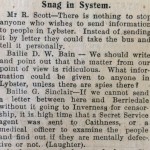
Back in Caithness, the question of censorship delays to local letters rumbled on. The Minister of Information had written to Wick Burgh, and had attempted to explain why letters between Lybster and Wick had to go via Inverness. The John O’Groat Journal reported the discussion at Wick Town Council. “Mr R Scott: There is nothing to stop anyone who wishes to send information to people in Lybster. Instead of sending it by letter they could take the bus and tell it personally.” And Baillie Sinclair added sarcastically: “If we cannot send a letter between here and Berriedale without it going to Inverness for censorship, it is high time that a Secret Service agent was sent to Caithness, or a medical officer to examine the people and find out if they are mentally defective or not. (Laughter)”
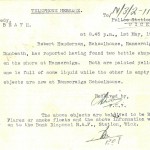
Mines were still a constant hazard along the coast of Caithness. Police Constable Alexander Gunn at Mey reported on 2 May, “I beg to report that on Wednesday afternoon, 29 April 1942, Alexander C. Ross, SXHF/47/1, crofter and presently coastwatcher, “Rosebank”, Freswick, Canisbay, found a mine washed ashore in a goe near Berryhill, Auckengill. The mine is a British one… It was taken charge of by the mine disposal squad on the following night.”
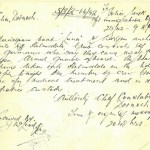 The Dornoch Police notified Wick on 2 May that the “Norwegian boat “Luna” of Bergen
The Dornoch Police notified Wick on 2 May that the “Norwegian boat “Luna” of Bergen 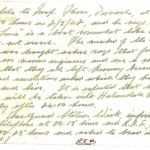 anchored ½ mile off Helmsdale. Crew consists of five Germans who say they came away from Bergen. Armed guard aboard. The boat is being taken into Helmsdale on the tide at 11pm tonight.” Another note adds, “The member of the crew who was brought ashore says that four of them are marine engineers and one a soldier and that they all left Norway because of the bad conditions under which they had to work and live”.
anchored ½ mile off Helmsdale. Crew consists of five Germans who say they came away from Bergen. Armed guard aboard. The boat is being taken into Helmsdale on the tide at 11pm tonight.” Another note adds, “The member of the crew who was brought ashore says that four of them are marine engineers and one a soldier and that they all left Norway because of the bad conditions under which they had to work and live”.
Finally this week, the risks of active service even in the Home Guard were brought home when the John O’Groat Journal reported the death of Alexander John Sutherland of Middleton, Thurso, who was killed by an explosion 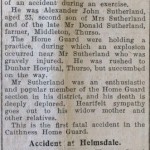 while he was on an exercise. He was only 23. The paper also reported that Dan Cormack of Helmsdale narrowly escaped serious injury “when a practice hand grenade exploded within a few feet from where he was standing. Mr Cormack was rather severely cut about the face, and also suffered from shock.”
while he was on an exercise. He was only 23. The paper also reported that Dan Cormack of Helmsdale narrowly escaped serious injury “when a practice hand grenade exploded within a few feet from where he was standing. Mr Cormack was rather severely cut about the face, and also suffered from shock.”
